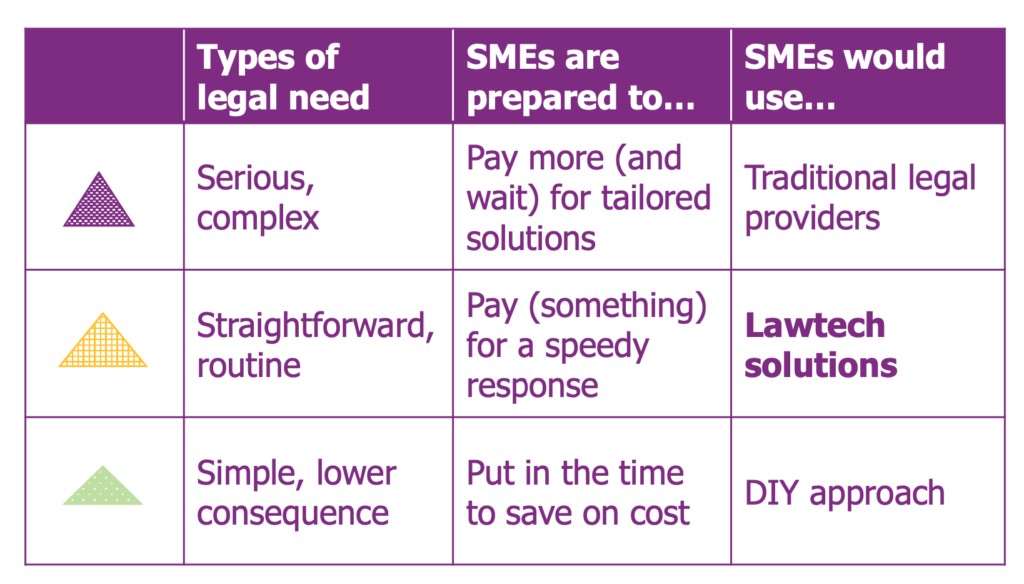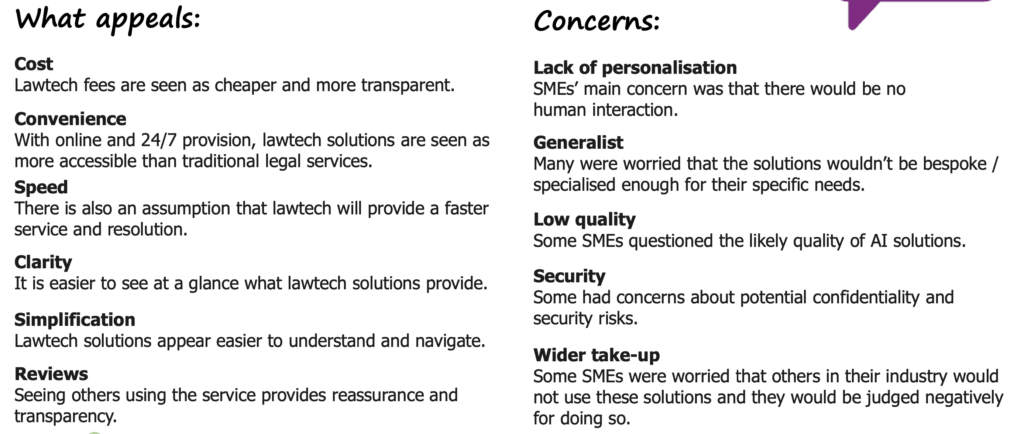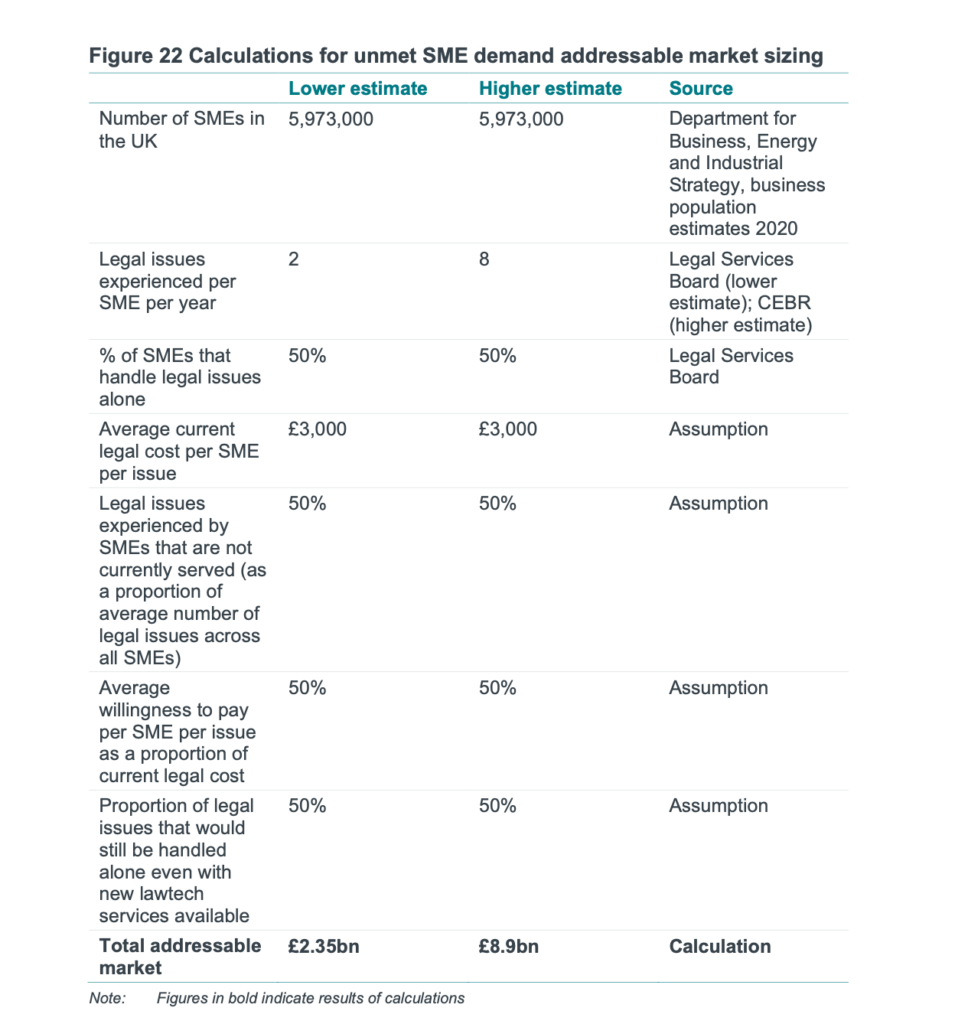
One of the great ironies of our civilisation is that it is held together by laws, and we have many thousands of lawyers, yet most small to medium size (SME) businesses – which are the majority of all enterprises in any country – find it hard to leverage legal services. Moreover, when it comes to legal tech for SMEs, they remain underserved, despite what research shows is a huge potential market of unmet need. For example, unmet legal demand from UK SMEs and consumers is valued at up to £11.4bn ($15.5bn) annually. To put that in context, the entire UK legal market is worth around £37bn, ($50.4bn). I.e. the market here – and no doubt the same is true in other markets – could grow by almost a third if that need could be met. And this is where legal tech comes in.
A new research report for LawtechUK, the government-backed initiative within Tech Nation, and the Legal Services Board (LSB), states that it ‘has revealed a gap in the market for legal tech companies to better support SMEs to deal with legal issues and reduce their unmet need’.
In the qualitative study, 40 SMEs from different sectors (10 of whom had previously used legal tech tools) were asked about their business’s legal problems and how they access legal advice and support.
The research found:
- Many SMEs do not know when or whether to involve lawyers – and some do not recognise when they have a legal problem.
- Most SMEs can see a role for legal tech solutions, particularly for their most common legal needs, such as finding a legal service provider in the marketplace and preparing legal documents.
- Many SMEs see legal tech solutions as complementing existing services, and/or bridging a gap between traditional legal providers and ‘DIY law’ and noted the importance of access to in-person support alongside digital tools.
- SMEs’ legal needs fell broadly into two categories: reactive, for example, debt recovery, dispute resolutions, or HR issues; and proactive, for example, routine legal document drafting.
Earlier this year, the Lawtech UK Report 2021 also stated that UK SMEs could make cost savings of up to £8.6bn each year by using legal tech products and services.
As the table below from the recent report shows, there are two main ways that legal tech can help (called lawtech within this report) – for routine work where tech can speed the work and drive efficiency, resulting in lower costs; and also with DIY work, e.g. creating legal docs such as via LegalZoom. (NB: This site would usually lump DIY tools together with other legal tech products.)

The report also outlined the pros and cons for tech solutions. Speed and cost clearly appealed, but there was also some concern over the capability of tools to handle their needs.

However, from this site’s point of view, some of this fear could be based on a false premise that legal tech tools can, except in certain very clear circumstances e.g. in DIY contract production, ‘do everything for you’. Once an SME is engaged in a legal process, even something as narrow as getting another party to pay a bill, there will usually have to be some form of interaction with more than just the tech tool, even if this is in relation to accepting or refusing an automated settlement and then having to consider the legal risks around an appeal process or escalation of the issue that then may follow.
The reality is that most legal needs remain complex and require a lot of often unpredictable and expert input, even if the matter is of a low value compared to the work of City law firms. Legal tech tools can help consumers and SMEs to a certain degree, especially with DIY documents, and also to find the right lawyers to help them, but they cannot just erase the need for lawyers when things get tricky.
That said, tech can help provide information that could head off the escalation of legal needs, and also make working with a lawyer a lot smoother and faster, thereby reducing costs.
I.e. for this site, the answer to unmet legal needs is not trying to make tools that totally erase the input of lawyers, but rather to get those lawyers to leverage tech that makes them affordable and useable by the vast majority of SMEs. Predictable and fixed fee pricing would also go a long way to helping. In some cases the SME may engage with a company where the legal input is ‘behind the scenes’, but it may well still be needed.
But, many law firms that service SMEs are potentially not doing all they can with the tech tools available to make life better for their clients – and that is because they can get stuck in the ‘time = money’ philosophy that is so toxic to small companies seeking legal help.
Perhaps as more legal tech companies come into this segment of the market those barriers can be broken down and more of the unmet need can be met, whether directly via legal tech, or through more positive working relationships with SME-focused law firms that have onboarded tech tools for their clients.
Jenifer Swallow, LawtechUK Director at Tech Nation, said: ‘SMEs make up 99% of all UK businesses and 60% of jobs, and are fundamental to our communities, yet too often they end up ‘going it alone’ when it comes to legal issues. Owners of SMEs are often time poor and accessing legal services is seen as too hard, too expensive and a low priority compared to the list of pressures they face running their business.
‘Speaking to SMEs, they point to a clear role for lawtech, giving them access to legal support that is timely, affordable, convenient and reassuring – and, importantly, that increases their resilience over time. The debate is often framed around technology replacing existing services, but our research shows that lawtech offers new opportunities for legal service providers to meet the unmet needs of SMEs and make many people’s lives easier in the process.
‘For lawtech innovators, our research shows that the SME market is one where transformative legal products can thrive, and support the tens of thousands of SMEs in need of their assistance.’
While, Matthew Hill, Chief Executive of the Legal Services Board, added: ‘Too many businesses are still not getting access to legal services that would help them. Technology offers potential solutions by making services more convenient, easier to use and often cheaper.
‘That’s why the LSB is setting an open stance for regulation and technology in the legal sector. We encourage legal regulators to actively reach out to innovators to foster innovation that increases access to legal services. We’d like to see them looking for opportunities to collaborate with innovators to identify and reduce barriers – be they technical, practical or about confidence. Then, by developing appropriate regulatory frameworks, regulators can build trust and confidence in the legal services market and help reduce unmet legal need.’
And here is how they calculated some of those unmet demand figures. (See the earlier report here.)


1 Trackback / Pingback
Comments are closed.